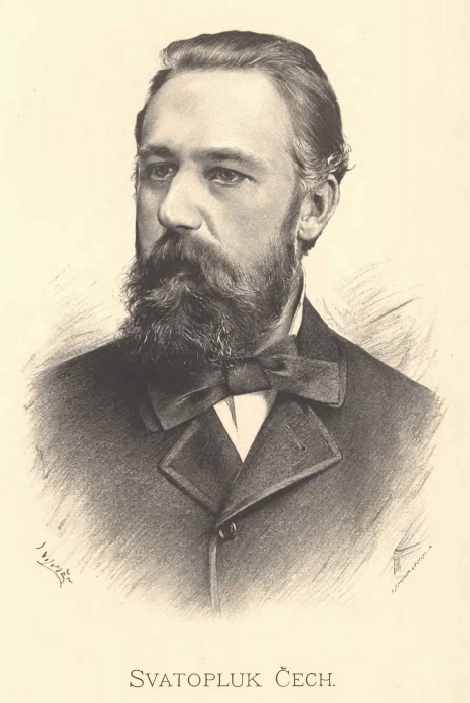|
Ostředek
Ostředek is a municipality and village in Benešov District in the Central Bohemian Region of the Czech Republic. It has about 500 inhabitants. Administrative parts Villages of Bělčice, Mžižovice, Třemošnice and Vráž are administrative parts of Ostředek. Geography Ostředek is located about northeast of Benešov and southeast of Prague. It lies in the Benešov Uplands. The highest point is at above sea level. The Ostředecký Brook originates here, flows across the municipality and supplies a system of ponds. History The first written mention of Ostředek is from 1356. Transport The D1 motorway from Prague to Brno leads across the municipality. Sights The landmark of Ostředek is the Ostředek Castle. It is a Baroque building with Neoclassical modifications. The castle complex includes the valuable Chapel of Saint John of Nepomuk, which was added to the castle in 1739. Notable people *Svatopluk Čech Svatopluk Čech (21 February 1846 in Ostředek near Benešo ... [...More Info...] [...Related Items...] OR: [Wikipedia] [Google] [Baidu] |
D1 Motorway (Czech Republic)
The D1 highway ( cs, Dálnice D1) is the main highway of the Czech Republic. Currently it connects the two biggest Czech cities, Prague and Brno; in the future it will be extended to Ostrava and to the Czech–Polish border in Věřňovice (Karviná District) / Gorzyczki (Wodzisław County). It is long, but the planned length is . It is the busiest motorway in the Czech Republic, with a maximum AADT of 99,000 vehicles per day near Prague. History First attempt The Munich Agreement in 1938 deprived the country of some fundamental road and rail routes. The government rushed to prepare three major infrastructure projects: the Německý Brod – Brno railway; the Plzeň – Ostrava road; and a 4-lane highway from Prague to Velký Bočkov (on the Czechoslovak – Romanian border). On 23 December 1938 the government issued Decree no. 372/1938 Coll. concerning the construction of motorways, establishing the General Motorway Directorate. This decree called for construction of an ... [...More Info...] [...Related Items...] OR: [Wikipedia] [Google] [Baidu] |
Benešov District
Benešov District ( cs, okres Benešov) is a district (''okres'') within Central Bohemian Region of the Czech Republic. Its capital is the town of Benešov. Complete list of municipalities Benešov – Bernartice – Bílkovice – Blažejovice – Borovnice – Bukovany – Bystřice – Čakov – '' Čechtice'' – Čerčany – Červený Újezd – ''Český Šternberk'' – Chářovice – Chleby – Chlístov – Chlum – Chmelná – Chocerady – Choratice – Chotýšany – Chrášťany – Ctiboř – Čtyřkoly – Děkanovice – '' Divišov'' – Dolní Kralovice – Drahňovice – Dunice – Heřmaničky – Hradiště – Hulice – Hvězdonice – Jankov – Javorník – Ješetice – Jinošice – Kamberk – Keblov – Kladruby – Kondrac – Kozmice – Křečovice – Krhanice – '' Křivsoudov'' – Krňany – Kuňovice – Lešany – Libež – Litichovice – Loket – ''Louňovice pod Blaníkem'' – Lštěn� ... [...More Info...] [...Related Items...] OR: [Wikipedia] [Google] [Baidu] |
Svatopluk Čech
Svatopluk Čech (21 February 1846 in Ostředek near Benešov – 23 February 1908 in Prague) was a Czech writer, journalist and poet. Biography Čech studied at gymnasium (secondary school) in Prague, then studied law, and later worked in the journals Květy, Lumír and Světozor. His first poem, ''Husita na Baltu'', was published in the almanac ''Ruch'' in 1868. Similarly to his work ''Adamité'', it is inspired by history (Hussite Wars). His poem ''Evropa'' (1878) takes its cue from revolutionary movements of the time, his poem ''Slávie'' (1882) propagates ideals of Slavic unity, the poem ''Václav z Michalovic'' (1880) depicts religious oppression by the Jesuits, his poem ''Lešetínský kovář'' (1883 confiscated, 1899) social problems of industrialization. The books of lyrical poetry ''Jitřní písně'' (1887) and ''Nové písně'' (1888) reflect the national rebirth of the Czech people, and his poetry cycle ''Písně otroka'' reflects social problems. His best know ... [...More Info...] [...Related Items...] OR: [Wikipedia] [Google] [Baidu] |
Gusta Fučíková
Gusta Fučíková, born ''Gusta (Augusta) Kodeřičová'' (28 August 1903 Ostředek – 25 March 1987), was a Czechoslovakia, Czechoslovak publicist and editor, politician of the Czechoslovak Communist Party, an activist of women's and left-wing peace movements, and deputy of the ''Sněmovna lidu Federálního shromáždění'' ("Chamber of the People of the Federal Assembly (Czechoslovakia), Federal Assembly", one of the two chambers of the Czechoslovak Federal Assembly) during the so-called Normalization (Czechoslovakia), Normalization period. She was the wife of the Communist politician Julius Fučík (journalist), Julius Fučík who was executed by the Nazi occupiers during the World War II. References {{DEFAULTSORT:Fucikova, Gusta 1903 births 1987 deaths People from Benešov District People from the Kingdom of Bohemia Members of the Central Committee of the Communist Party of Czechoslovakia Members of the Chamber of the People of Czechoslovakia (1971–1976) Members o ... [...More Info...] [...Related Items...] OR: [Wikipedia] [Google] [Baidu] |
